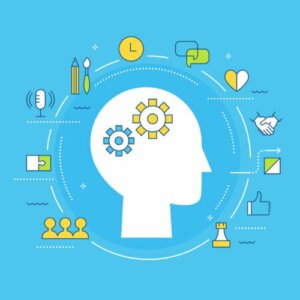All About the Theory of Multiple Intelligences

The theory of multiple intelligences appeared thanks to Howard Gardner. In his book Frames of Mind (1983), he broadened the definition of intelligence and described several different types of intellectual competencies.
He developed eight different types and explained that we can all have these intelligences and even more than one. What’s more, each person can differ from others depending on their lived experience or on their genetics. In any case, it’s important to know them in order to develop them.
The theory of multiple intelligences

Linguistic or linguistic-verbal intelligence
Linguistic or linguistic-verbal intelligence is part of Howard Gardner’s theory of multiple intelligences. It deals with sensitivity to spoken and written language and the ability to learn languages. At the same time, it refers to the ability to use language to achieve certain objectives.
People with linguistic intelligence, such as William Shakespeare and Oprah Winfrey, have the ability to analyze information and create products that involve spoken and written language, such as speeches, books and memos.
Possible career options:
- Lawyer
- Speaker
- Writer
- Journalist
- Lecturer
Logical-mathematical intelligence
At the same time, logical-mathematical intelligence refers to the ability to analyze problems in a logical way, perform mathematical operations, and investigate questions scientifically. People with logical-mathematical intelligence have the ability to develop equations and tests and make calculations. Similarly, they can solve abstract problems – for example, Albert Einstein and Bill Gates.
Possible career options:
- Mathematician
- Accountant
- Statistician
- Scientist
- Computer scientist
- Engineer
Spatial intelligence
Spatial intelligence has the potential to recognize and manipulate the patterns of a wide space – for example, those that navigators and pilots use. At the same time, they can recognize and manage the patterns of more confined areas, such as those of importance to sculptors, surgeons, chess players, graphic artists, artists or architects.
People with spatial intelligence have the ability to recognize and manipulate large-scale, detailed spatial images. For example, we have Frank Lloyd Wright and Amelia Earhart. This is undoubtedly a great ability.
Possible career options:
- Pilot
- Surgeon
- Architect
- Graphic artist
- Interior decorator
Kinesthetic-body intelligence
Body kinesthetic intelligence is the potential to use the whole body or parts of the body (such as the hand or mouth) to solve problems or create products. So, people with kinesthetic body intelligence have the ability to use their own body to create products, perform skills, or solve problems through body-mind connection – for example, Michael Jordan and Simone Biles.
Possible career options:
- Dancer
- Athlete
- Surgeon
- Mechanic
- Carpenter
- Physiotherapist

Musical intelligence
In addition, musical intelligence refers to the ability to interpret, compose, and appreciate musical patterns. So, people with musical intelligence have the ability to recognize and create musical tone, rhythm, and timbre. Examples include Beethoven and Ed Sheeran.
Possible career options:
- Singer
- Composer
- DJ
- Musician
Interpersonal intelligence
Next, interpersonal intelligence is the ability to understand the intentions, motivations, and desires of other people. And, consequently, to work effectively with others. People with interpersonal intelligence also have the capacity to recognize and understand the moods, desires, motivations, and intentions of other people. For example, we can mention Mahatma Gandhi and Mother Teresa.
Possible career options:
- Teacher
- Psychologist
- Manager
- Sales
- Public relations
Intrapersonal intelligence
Similarly, intrapersonal intelligence is the ability to understand oneself, to have an effective working model, including one’s desires, fears and abilities, and to use that information effectively to regulate one’s life.
At the same time, people with intrapersonal intelligence have the ability to recognize and understand their own moods, desires, motivations, and intentions. So, having this type of intelligence can help a person understand which life goals are important and how to achieve them. For example, Aristotle and Maya Angelou possessed this type of intelligence.
Possible career options:
- Therapist
- Psychologist
- Entrepreneur

Naturalistic intelligence
Finally, naturalistic intelligence implies experience in the recognition and classification of the many species – flora and fauna – in their environment. In other words, people with naturalistic intelligence have the ability to identify and distinguish between the different types of plants, animals, and weather formations found in the natural world. For example, we can look at Charles Darwin and Jane Goodall.
Possible career options:
- Botanist
- Biologist
- Astronomer
- Meteorologist
- Geologist
Now that you know the eight intelligences that make up Gardner’s Theory of Multiple Intelligences, you have may have identified with one or more of them. What’s more, you may even see them in your children. In any case, what matters is that you always follow your learning instincts to develop your full potential.
The theory of multiple intelligences appeared thanks to Howard Gardner. In his book Frames of Mind (1983), he broadened the definition of intelligence and described several different types of intellectual competencies.
He developed eight different types and explained that we can all have these intelligences and even more than one. What’s more, each person can differ from others depending on their lived experience or on their genetics. In any case, it’s important to know them in order to develop them.
The theory of multiple intelligences

Linguistic or linguistic-verbal intelligence
Linguistic or linguistic-verbal intelligence is part of Howard Gardner’s theory of multiple intelligences. It deals with sensitivity to spoken and written language and the ability to learn languages. At the same time, it refers to the ability to use language to achieve certain objectives.
People with linguistic intelligence, such as William Shakespeare and Oprah Winfrey, have the ability to analyze information and create products that involve spoken and written language, such as speeches, books and memos.
Possible career options:
- Lawyer
- Speaker
- Writer
- Journalist
- Lecturer
Logical-mathematical intelligence
At the same time, logical-mathematical intelligence refers to the ability to analyze problems in a logical way, perform mathematical operations, and investigate questions scientifically. People with logical-mathematical intelligence have the ability to develop equations and tests and make calculations. Similarly, they can solve abstract problems – for example, Albert Einstein and Bill Gates.
Possible career options:
- Mathematician
- Accountant
- Statistician
- Scientist
- Computer scientist
- Engineer
Spatial intelligence
Spatial intelligence has the potential to recognize and manipulate the patterns of a wide space – for example, those that navigators and pilots use. At the same time, they can recognize and manage the patterns of more confined areas, such as those of importance to sculptors, surgeons, chess players, graphic artists, artists or architects.
People with spatial intelligence have the ability to recognize and manipulate large-scale, detailed spatial images. For example, we have Frank Lloyd Wright and Amelia Earhart. This is undoubtedly a great ability.
Possible career options:
- Pilot
- Surgeon
- Architect
- Graphic artist
- Interior decorator
Kinesthetic-body intelligence
Body kinesthetic intelligence is the potential to use the whole body or parts of the body (such as the hand or mouth) to solve problems or create products. So, people with kinesthetic body intelligence have the ability to use their own body to create products, perform skills, or solve problems through body-mind connection – for example, Michael Jordan and Simone Biles.
Possible career options:
- Dancer
- Athlete
- Surgeon
- Mechanic
- Carpenter
- Physiotherapist

Musical intelligence
In addition, musical intelligence refers to the ability to interpret, compose, and appreciate musical patterns. So, people with musical intelligence have the ability to recognize and create musical tone, rhythm, and timbre. Examples include Beethoven and Ed Sheeran.
Possible career options:
- Singer
- Composer
- DJ
- Musician
Interpersonal intelligence
Next, interpersonal intelligence is the ability to understand the intentions, motivations, and desires of other people. And, consequently, to work effectively with others. People with interpersonal intelligence also have the capacity to recognize and understand the moods, desires, motivations, and intentions of other people. For example, we can mention Mahatma Gandhi and Mother Teresa.
Possible career options:
- Teacher
- Psychologist
- Manager
- Sales
- Public relations
Intrapersonal intelligence
Similarly, intrapersonal intelligence is the ability to understand oneself, to have an effective working model, including one’s desires, fears and abilities, and to use that information effectively to regulate one’s life.
At the same time, people with intrapersonal intelligence have the ability to recognize and understand their own moods, desires, motivations, and intentions. So, having this type of intelligence can help a person understand which life goals are important and how to achieve them. For example, Aristotle and Maya Angelou possessed this type of intelligence.
Possible career options:
- Therapist
- Psychologist
- Entrepreneur

Naturalistic intelligence
Finally, naturalistic intelligence implies experience in the recognition and classification of the many species – flora and fauna – in their environment. In other words, people with naturalistic intelligence have the ability to identify and distinguish between the different types of plants, animals, and weather formations found in the natural world. For example, we can look at Charles Darwin and Jane Goodall.
Possible career options:
- Botanist
- Biologist
- Astronomer
- Meteorologist
- Geologist
Now that you know the eight intelligences that make up Gardner’s Theory of Multiple Intelligences, you have may have identified with one or more of them. What’s more, you may even see them in your children. In any case, what matters is that you always follow your learning instincts to develop your full potential.
All cited sources were thoroughly reviewed by our team to ensure their quality, reliability, currency, and validity. The bibliography of this article was considered reliable and of academic or scientific accuracy.
- Gardner, H. (2019) Inteligencias múltiples: La teoría en la práctica. Editorial: Paidós Educación
This text is provided for informational purposes only and does not replace consultation with a professional. If in doubt, consult your specialist.








